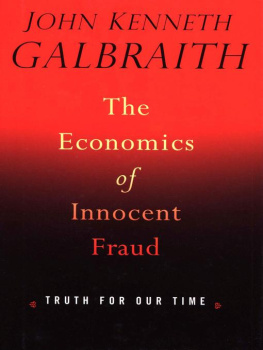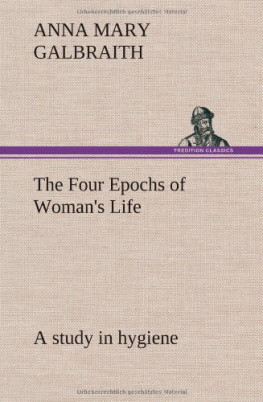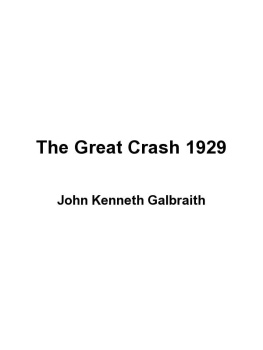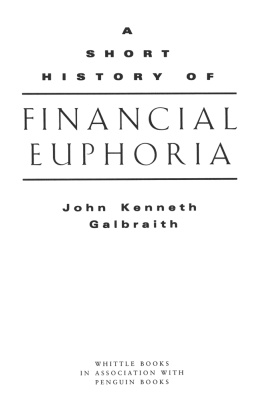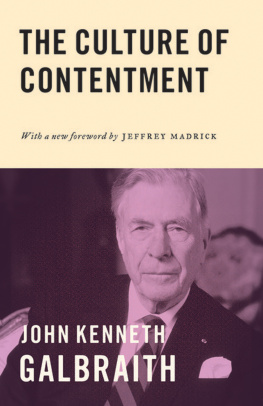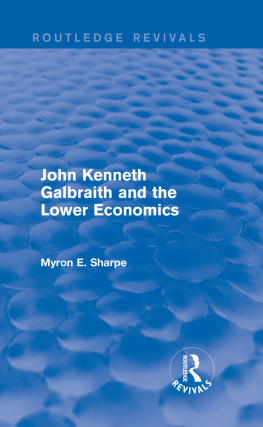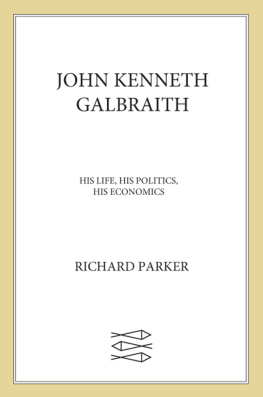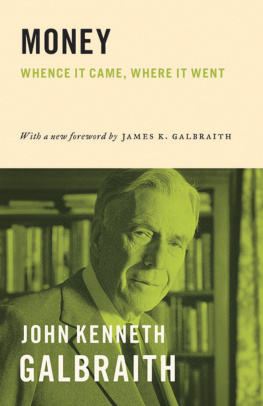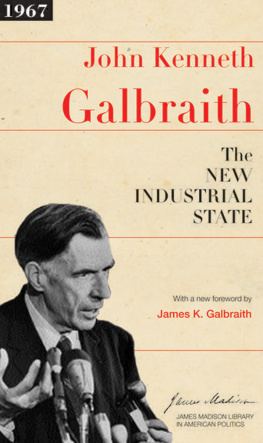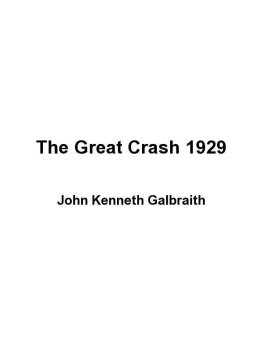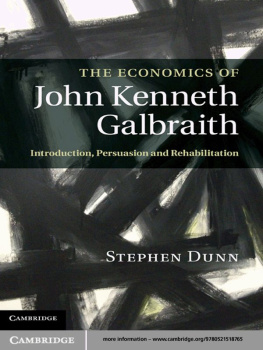I THE NATURE OF INNOCENT FRAUD
T HIS TREATISE must, at the outset, contend with a seeming and severe contradiction: How can fraud be innocent? How can innocence be fraudulent? The answer is of no slight significance, for innocent, lawful fraud has an undoubted role in private life and public discourse. However, by neither those so believing nor those so guiding is there spoken recognition of that fact. There is, to emphasize, no sense of guilt or responsibility.
Some of this fraud derives from traditional economics and its teaching and some from the ritual views of economic life. These can strongly support individual and group interest, particularly, as might be expected, that of the more fortunate, articulate and politically prominent in the larger community, and can achieve the respectability and authority of everyday knowledge. This is not the contrivance of any individual or group but represents the natural, even righteous view of what best serves personal or larger interest.
An articulate community, liberal in the United States, social democratic or socialist in Europe and Japan, does ascribe economic or other motive to the interest-serving view. This can be quite wrong. What rewards particular interest may reflect only a normal tendency to self-benefiting expression and action.
A S I HAVE INDICATED , most of this extended essay has to do with economic matters. The reason, as I've also said, is a lifetime, and by common statistical standards rather more, of teaching, writing, discussing economics and on occasion directing economic action. The discussion has extended to the distinguished economic figures of the time, including those encountered during my term as president of the American Economic Association. Economics has been large in my life.
What I have read, heard, taught, was, I trust, well motivated. But there is always popular error. What prevails in real life is not the reality but the current fashion and the pecuniary interest. So compelling is this that, as the next chapter tells, even the everyday characterization of the economic system has been affected. When capitalism, the historic reference, ceased to be acceptable, the system was renamed. The new term was benign but without meaning. To this I now turn.
II THE RENAMING OF THE SYSTEM
T HE ECONOMIC SYSTEM that is common to all the economically advanced countries of the world and in more diffuse form to othersthe exceptions being North Korea, Cuba and, in reference but not in reality, Chinaaccords ultimate economic authority to those in control of the relevant plant, equipment, land and supporting financial resources. Once owners were in charge; now firms above a certain size and with tasks at a high level of complexity have management. Managers, as will later be emphasized, not the owners of capital, are the effective power in the modern enterprise. For this reason and because the term "capitalism" evokes a sometimes sour history, the name is in decline. In the reputable expression of economists, business spokesmen, careful political orators and some journalists, it is now "the Market System." The word "capitalism" is still heard but not often from acute and articulate defenders of the system.
T HERE IS NO SERIOUS DOUBT as to what brought the change. Capitalism emerged in Europe from the merchant era with the manufacture, buying, selling and transport of goods along with the rendering of services. Then came the industrialists, with power and prestige given by ownership, direct or indirect, and workers who suffered from their undoubted bargaining weaknesslife as the alternative to often painful toiland the resulting oppression. Marx and Engels, in some of history's most influential prose, outlined the prospect and the promise of revolution. At the end of World War I, in Russia and on its borders, the threat became the reality. Especially in Europe, the word "capitalism" affirmed too stridently this power of ownership and the magnitude of worker and larger subjugation. So came the more than plausible possibility of revolution.
In the United States, in the late nineteenth century, capitalism had a different but also negative connotation. Here it was not in the workers alone that it cultivated an adverse reaction. It also, in important measure, affected the public at large. It meant price, cost exploitation. Such was the response to the monopoly or near monopoly by John D. Rockefeller of the supply of oil, a product widely needed for illumination and other household purposes, of steel by Carnegie and tobacco by Duke. There was also the diverse power of the railroad magnates and of J. R Morgan and his counterparts in banking and finance. In 1907, the seeming danger of widespread bankruptcy in Wall Street led to the belief that capitalism was not only exploitative but, with larger effect, self-destructive.
Beginning in the early years of the twentieth century came the American reaction in a broad thrust of legislation. The Sherman Antitrust Act sought to prevent and to punish monopolistic abuse. The Federal Reserve System was established in 1913 as a restraining force on the financial community. During Woodrow Wilson's presidency the Federal Trade Commission was introduced, with an impressive regulatory role. So negative had become the reputation of capitalism that Republicans joined and sometimes led Democrats in attempts to correct its abuses. In Europe the word "capitalism" had evoked revolution; in the United States it brought legislation, adverse judicial decisions and regulation.
There was more. During World War I, sophisticated thought, extending to belief, held that the source of the conflict and its mass death and destruction had been the rivalry between the great arms and steel combines of France and Germany. In back of the slaughter were those who, for profit, made the guns.
Later, and more destructive to the reputation of capitalism in the United States, was the visibly insane Florida real estate speculation, the rising corporate and industrial voice and, most important, the stock market explosion of the late 1920s. Then came the world-resonating crash of 1929 and, for ten long years, the Great Depression. Capitalism all too obviously did not work. So denoted, it was unacceptable.
There followed a determined search for a benign alternative name. "Free Enterprise" had a trial in the United States. It didn't take. Freedom, meaning for enterprise decisions, was not reassuring. In Europe there was "Social Democracy"capitalism and socialism in a companionate mix. In the United States, however, socialism was (as it remains) unacceptable. In the next years reference was to the New Deal; this, however, was too clearly identified with Franklin D. Roosevelt and his cohorts. So in reasonably learned expression there came "the market system." There was no adverse history here, in fact no history at all. It would have been hard, indeed, to find a more meaningless designationthis a reason for the choice.
Markets have been important in human existence at least since the invention of coinage, commonly ascribed to the Lydians in the eighth century b.c. A respectable span of time. In all countries, including the former Soviet Union, as also in what is still by some called Communist China, they had a major role.
In the conventional economic instruction of the past, the market had special identification with consumer sovereigntywith the controlling power of the consumer in deciding what would be produced, bought and sold. Here, it was said, was the final authority to which the producing firm, the capitalist, was amply subordinate. Economic democracy, however, was too contrived to last, even in the textbooks.
Product innovation and modification is a major economic function, and no significant manufacturer introduces a new product without cultivating the consumer demand for it. Or forgoes efforts to influence and sustain the demand for an existing product. Here enters the world of advertising and salesmanship, of television, of consumer manipulation. Thus an impairment of consumer and market sovereignty.

